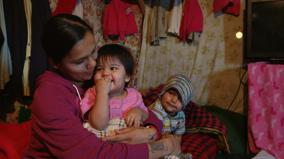No Address
Far from home and cut off from family and friends, Montreal’s Indigenous homeless population is the focus of No Address. Dreams of a better life in the big city can be met with harsh realities, as the individuals in this documentary recount. Often trying to flee circumstances created by colonialism and the effects of assimilation, the First Nations and Inuit people in this work share frank stories about their lives and the paths that took them to the streets of Montreal. Alanis Obomsawin presents an honest, stark portrayal of endemic homelessness while giving voice to those so often overlooked or …

Details
-
directorAlanis Obomsawin
-
scriptAlanis Obomsawin
-
producerMarrin CanellAlanis Obomsawin
-
executive producerColin Neale
-
cameraRoger Rochat
-
soundJacques DrouinYves Gendron
-
editingMarrin Canell
-
sound editingWojtek Klis
-
re-recordingHans Peter Strobl
-
musicDominique Tremblay
Education
Warnings: M (discussion of prostitution, drug use, some swearing). This film can be used to develop understandings of root causes of homelessness through discussions, critical inquiry and research. How has colonization contributed to homelessness of Indigenous people? Do the needs of homeless people exceed the resources of non-profit social service groups? What attracted the characters in the film to want to move to a city rather than staying in rural isolated communities? Research policies that tried to strip Inuit of their cultural identity (Inuit dog slaughters, Inuit dog-tags, project surname, and forced relocation) and consider the long-term social implications. How does loss of cultural identity contribute to homelessness and other negative social impacts that some Inuit may face? What social outlets are available in cities for Indigenous people who are in need? How does one become trapped without a means to return to their community? What ethical actions can be taken as a society to eliminate homelessness?

















